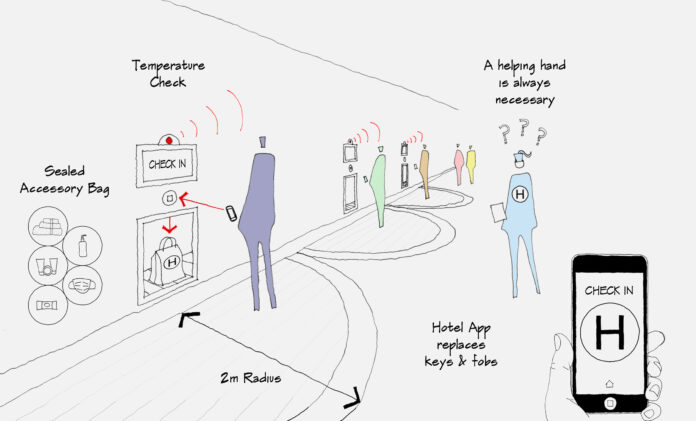UK architecture studio The Manser Practice has outlined how hotels could be adapted to allow social distancing when they reopen, and how future designs will be impacted by the coronavirus pandemic. Post-pandemic hotels will have no receptionists and will adopt touchless access, one-way systems and larger rooms with inbuilt gyms according to The Manser Practice, which has designed numerous hotels including several for Hilton. The coronavirus could also lead to a rejection of Airbnb, the death of hotel conferencing, the return to favour of the paternoster lift and the construction of custom-built, self-contained isolation hotel rooms.
“People will want the assurance of clean space”
The studio predicts that a key focus of future hotel rooms will be cleanliness and the reduction of unnecessary contact – something that is hard to achieve in shared spaces with a quick turnover of guests.This could lead people to move away from private rental services like Airbnb in favour of larger hotel chains.
In the short term, hotels will be adapted to minimise the interaction between staff and guests, with receptionists replaced by touchless check-in with temperature checks, while doors will be opened using a smartphone. “Do visitors still need to be welcomed and checked-in by receptionists?” asked Manser. “A hotel app could instead give guests touchless access to their room, delivery hatch and other hotel amenities.” “Using smart technologies to minimise the number of touch points between entry and the hotel room will put guests more at ease about potentially contaminated surfaces.” he continued.
“We imagine a return to the old forms of room service”
To reduce the contact between guests in existing hotels, which often have numerous rooms serviced by a single corridor, Manser suggests implementing one-way systems. “As a whole, the internal spatial layout of hotel buildings might change to one-way systems to minimise the crossover points of guests in narrow corridors,” said Manser.
To reduce the need to visit restaurants and for other staff to enter rooms, Manser believes that hotels could add “remote room delivery” services. “A remotely activated hatch on to the corridor giving access to a space big enough for delivery meals, laundry and dry cleaning etc.” “Staff place items in from outside and guests retrieve them from inside via a similar hatch,” he continued. “Dirties take the reverse route. Staff won’t need to enter the room, improving both privacy and social distancing.”
Analysis:
The envisions of the post-pandemic hotels give inspirations to the design of the future public space. It reveals the core of the problem is the clean assurance. Instead of sanitizing, the design emphasizes the avoidance of touch. The design adopts several practices to minimize the interactions between customers and staff or customers with any surface, such as a hotel app, to reduce the touchpoints between entry and room, a corridor for room delivery, and a touchless check-in with temperature checks.




